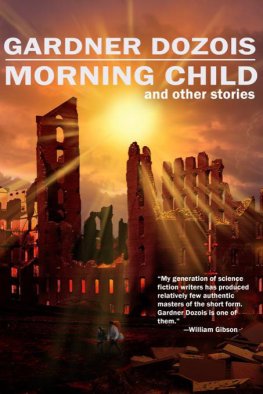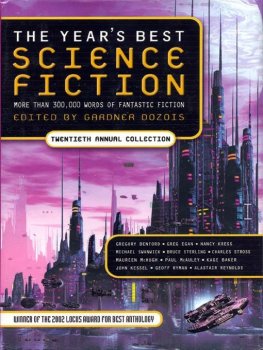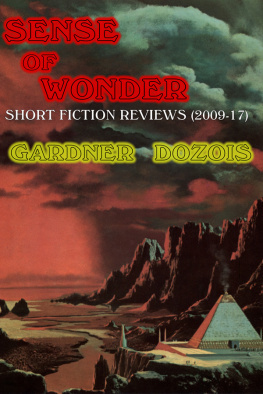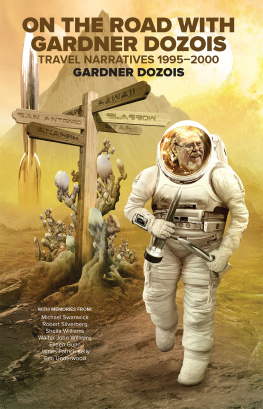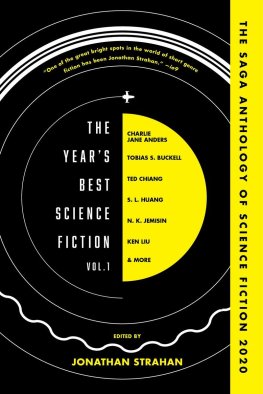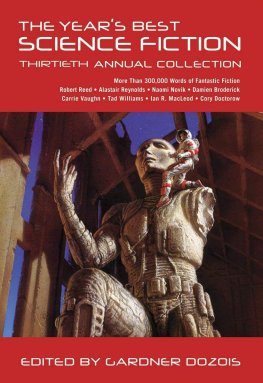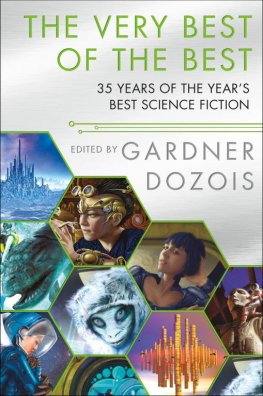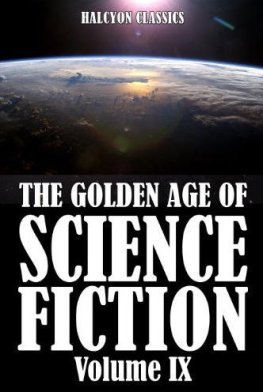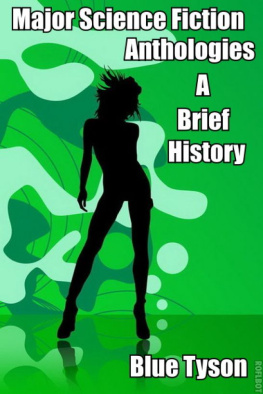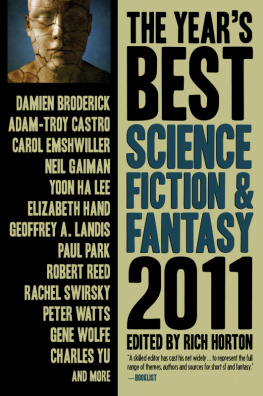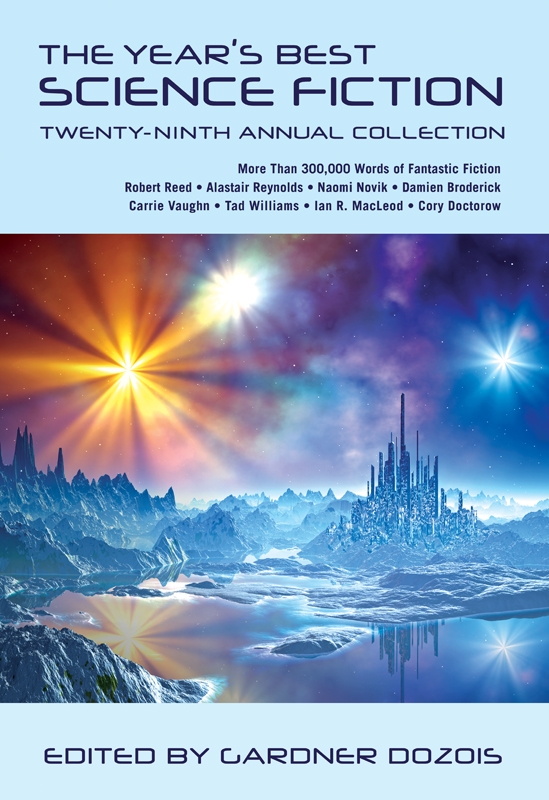
Contents
Paul McAuley
David Moles
Damien Broderick
Elizabeth Bear
John Barnes
Ken MacLeod
Karl Schroeder
Michael Swanwick
Peter S. Beagle
Carolyn Ives Gilman
Paul Cornell
Stephen Baxter
Ian McDonald
Alastair Reynolds
Maureen F. McHugh
Catherynne M. Valente
Jay Lake
Dave Hutchinson
Geoff Ryman
Tom Purdom
Ian R. MacLeod
David Klecha and Tobias S. Buckell
Robert Reed
Gwyneth Jones
Lavie Tidhar
Michael F. Flynn
Pat Cadigan
Michael Swanwick
Yoon Ha Lee
Jim Hawkins
Alec Nevala-Lee
Peter M. Ball
Chris Lawson
Ken MacLeod
Kij Johnson
Summation: 2011
Like last year, the big story in 2011 continues to be the explosion in e-book sales, which have been dramatic enough, and accrued fast enough, to make some commentators speculate that e-books will eventually drive physical print books out of existence altogether. I dont think thats going to happen anytime soon, if it ever does, but the e-book revolution has been impressive nevertheless, and shows no sign of losing momentum, especially with new devices like the Kindle Fire coming on sale, and no doubt other even more sophisticated devices waiting in the wings.
According to BookStats, a joint-research venture between the Book Industry Study Group and the Association of American Publishers, e-book sales jumped to $863.7 million in 2010 from $61.8 million in 2008. No reliable overall figures for 2011 are yet available, but one publisher predicted that e-books could account for as much as 40 percent of total revenue by the end of 2012. Considering that its been estimated that one in five U.S. adults are reading e-books on a variety of devices, from dedicated e-readers to media tablets, and that there was a major surge in e-book sales after the 2011 holiday season (all those people looking for something to read on the devices theyd gotten for Christmas presents), that could well turn out to be true. The AAP report for September 2011 shows e-book sales up 100 percent to $80.3 million. Year-to-date figures show e-books up 137.9 percent at $727.7 million. Barnes & Nobles second-quarter sales report (for the period ending October 29, 2011) shows NOOK sales (for both the devices themselves and for e-books) rising 85 percent to $220 million, four times what they were in the comparable period last year, according to CEO William Lynch.
None of this, impressive as it is, means that the print book industry has collapsed. There were still an enormous number of print books published in 2011, and many of them sold very well indeed. The U.S. Census Bureaus preliminary figures for October 2011 show estimated bookstore sales of $886 million, down 43 percent from September 2011, but down only 7 percent from October 2010 figures. For the year-to-date, sales are up 2 percent at $12.91 billion. Overall retail sales were up 1 percent from September, and up 8 percent year-to-date.
The effect of the e-book revolution can best be seen in the changes in the kinds of books that are selling best. Hardcovers and trade paperbacks both saw their numbers increase, with a noticeable boost in new titles, but the traditional mass-market paperback reprints dropped significantly, as did new mass-market titles. The fact that e-book sales are dramatically increasing at a time when mass-market paperback sales have dropped suggests that e-books are to some degree filling the market niche once occupied by mass-market print books, particularly reprint titles.
Unexpectedly, sales of print books also surged during the holiday season, with Barnes & Noble showing a 4 percent rise, the first increase in five years. This suggests that many people still find a print book to be a more satisfactory Christmas present than the gift of an e-booksomething physical to wrap and put under the tree.
For this reason, and the reason that for the foreseeable future there are going to be people who just prefer a print book they can hold in their hands to an e-book that must be read from a screen, and prefer browsing at a bookstore to shopping for books online, the publishing apocalypse that some commentators seem almost to yearn for, where all the publishing houses go out of business, physical brick-and-mortar bookstores disappear completely, and print books themselves become extinct (or at least rare artifacts), is probably not going to happenalthough things in the publishing world are never going to go back to the way they were before the invention of the e-book either. (Another factor not usually taken into consideration in conversations about the future of books is that even here in the twenty-first century, there are still plenty of people who dont have e-readers, dont have notebook tablets, dont have Internet access, dont even have computers of any sort, and their numbers may even swell as economic times harden. To ignore them would be to abandon a considerable subset of potential customers. Even the poorest of people may occasionally be able to afford a paperback book, where they might not be able to afford a Kindle or an iPad.)
Besides which, it doesnt really come down to a choice between print books and e-books. The most likely thing is that most customers will buy both print books and e-books, choosing one format or the other depending on the circumstances, convenience, their needs of the moment, even their whim. There are even some indications that in some cases people will buy both the e-book and print versions of the same book. The chances are fairly good that all of this will eventually lead to a general expansion of the book business in general, no matter what format the books are being sold in. More people seem to be reading more books, in whatever format, than ever beforeand that cant be bad news in the long run.
One of the other big stories of 2011 was the controversial move by Amazon to found their own publishing imprint, leading to accusations of antitrust practices, the charge being that Amazons immensely deep pockets (estimated at $40 billion in 2011) and its position as the leading online bookseller would enable it to engage in predatory pricing to destroy its retail competitors, the so-called Big Six publishing companies, by effortlessly outbidding them for bestsellers. This has led to what the Authors Guild blog has called a behind-the-scenes battle for control of the publishing industry, a three-sided battle between Amazon, the Big Six publishers, and Barnes & Noble, whose NOOK is the Kindles rival for dominance of the e-book market.
Another big story, one which has an impact on the story above, was the bankruptcy and collapse of the giant bookstore chain Borders, with Borders stores closing across the country. This means that fewer books have places where they can be sold, with total rack space decreasing dramatically nationwide as the 650 Borders bookstores disappeared, something that was itself widely feared to be apocalyptic last year, although the surviving chains and, particularly, online sales from places like Amazon.com and the Barnes & Noble online bookstore, BN.com(plus revenue from increased e-book sales)seem to have minimized the impact to some extent. Nevertheless, the behind-the-scenes impact of the Borders closing, in terms of diminished sales and adjustments to the number of books bought and the amount of money paid for them, to say nothing of industry employees dismissed to cut costs, is likely to reverberate through the publishing world for years to come.


